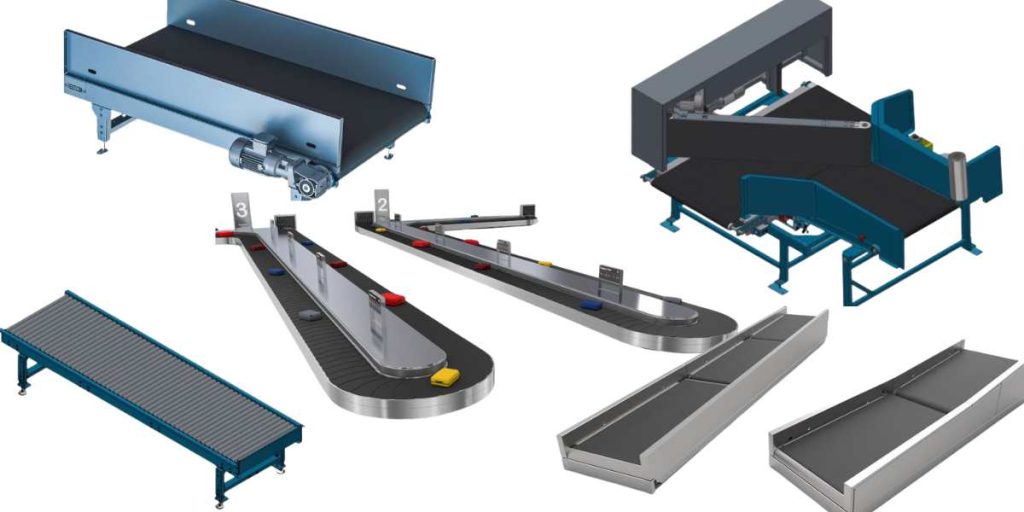Exploring Baggage Handling Systems in South Korea
South Korea, a nation synonymous with technological prowess, has its fingerprints all over the travel industry. This influence extends far beyond sleek airplanes and comfortable seating – it reaches deep into the underbelly of airports, specifically to the complex world of baggage handling systems (BHS). In this post, we’ll embark on a whirlwind tour of South Korea’s BHS landscape, exploring the technology, efficiency, and innovation that keep passengers’ luggage moving smoothly.

A Symphony of Sorting and Security
Imagine a meticulously choreographed ballet – a seamless flow of suitcases, duffel bags, and backpacks gracefully gliding through a labyrinth of conveyors, sorters, and security checkpoints. This is the essence of a modern BHS. In South Korea, airports like Incheon International Airport (ICN) boast some of the most advanced systems in the world.
ICN’s BHS is a marvel of engineering. A 43-kilometer long network of baggage conveyor systems snakes beneath the airport, silently whisking luggage away from check-in counters. These conveyors feed into sophisticated baggage sorting systems (BSS), which utilize a combination of automated tag readers (ATR) and radio-frequency identification (RFID) baggage tags to ensure each bag reaches its designated flight.
The Powerhouse Behind the Scenes
The magic behind South Korea’s BHS lies in its embrace of automation. Automated baggage handling systems (ABHS) are the backbone of these operations. ABHS utilizes a network of sensors, cameras, and computer programs to autonomously transport, sort, and screen luggage. This not only reduces reliance on manual labor but also improves operational efficiency for airlines and airports.
Baggage security screening is another area where South Korea shines. Integrated seamlessly into the BHS, state-of-the-art X-ray scanners and explosive detection systems ensure the safety of passengers and crew. Baggage tracking technology allows travelers to monitor their luggage’s journey in real-time, providing peace of mind throughout the travel experience.
Industry and Developments
South Korea’s BHS industry is a microcosm of the nation’s larger technological advancements. The ongoing expansion of Incheon International Airport, coupled with the ever-growing South Korean airline industry, fuels the demand for even more sophisticated baggage handling solutions.
This has led to the emergence of several prominent baggage handling system vendors in South Korea. These companies are constantly innovating, developing cutting-edge solutions like early baggage handling systems (EBHS) that expedite luggage delivery to waiting aircraft.
The future of baggage handling in South Korea is brimming with exciting possibilities. The integration of smart airport technology, such as facial recognition and AI-powered sorting systems, promises to further streamline the travel process.

Benefits and Challenges
The adoption of advanced BHS in South Korea offers a multitude of benefits. Improved passenger experience is a key advantage. Efficient luggage handling translates to shorter waiting times and reduced stress for travelers. Additionally, reduced baggage mishandling ensures that fewer bags go astray, minimizing inconvenience for passengers.
Operational efficiency for airlines and airports is another significant benefit. Automated systems lower labor costs and expedite baggage processing, allowing airlines and airports to handle increased passenger volumes.
However, implementing and maintaining these complex systems comes with its own set of challenges. Security considerations are paramount. Robust cybersecurity measures are essential to protect BHS from potential hacking attempts. Additionally, the cost-effectiveness of these systems needs careful consideration. While the long-term benefits are undeniable, the upfront investment can be substantial.
The Broader South Korean Landscape
South Korea’s expertise in BHS extends beyond major airports. Companies across the country are leading the way in manufacturing airport baggage handling equipment. From baggage conveyor systems to sophisticated sorting mechanisms, South Korean manufacturers are supplying the world with innovative solutions.
South Korean airport material handling systems are another area of excellence. These systems encompass not just baggage handling but also cargo management and other critical airport operations.
Specifics and Services
For those seeking more granular information, here’s a deeper dive:
- Several companies specialize in Incheon Airport baggage handling systems manufacturing. Researching these companies can provide valuable insights into the specific technologies employed at ICN.
- If you’re interested in automatic baggage handling systems South Korea, numerous suppliers offer a variety of solutions. Evaluating their offerings will help you find the best fit for your needs.
- Companies specializing in South Korea Vanderlande baggage handling systems can provide details about these specific systems, which are known for their reliability and efficiency.
Get a Quote from Top 6 Global Leader BHS Manufacturers
FAQs
Are South Korean airports known for efficient baggage handling?
Absolutely! South Korea boasts some of the most advanced BHS globally, utilizing automation and technology for smooth luggage movement.
What are the benefits of these advanced BHS systems?
Passengers experience shorter wait times and fewer lost bags. Airlines and airports enjoy improved efficiency and reduced costs.
Can I track my luggage through South Korea's BHS?
In many cases, yes! Many airports utilize RFID tags and tracking technology, allowing you to monitor your bag’s journey in real-time.





